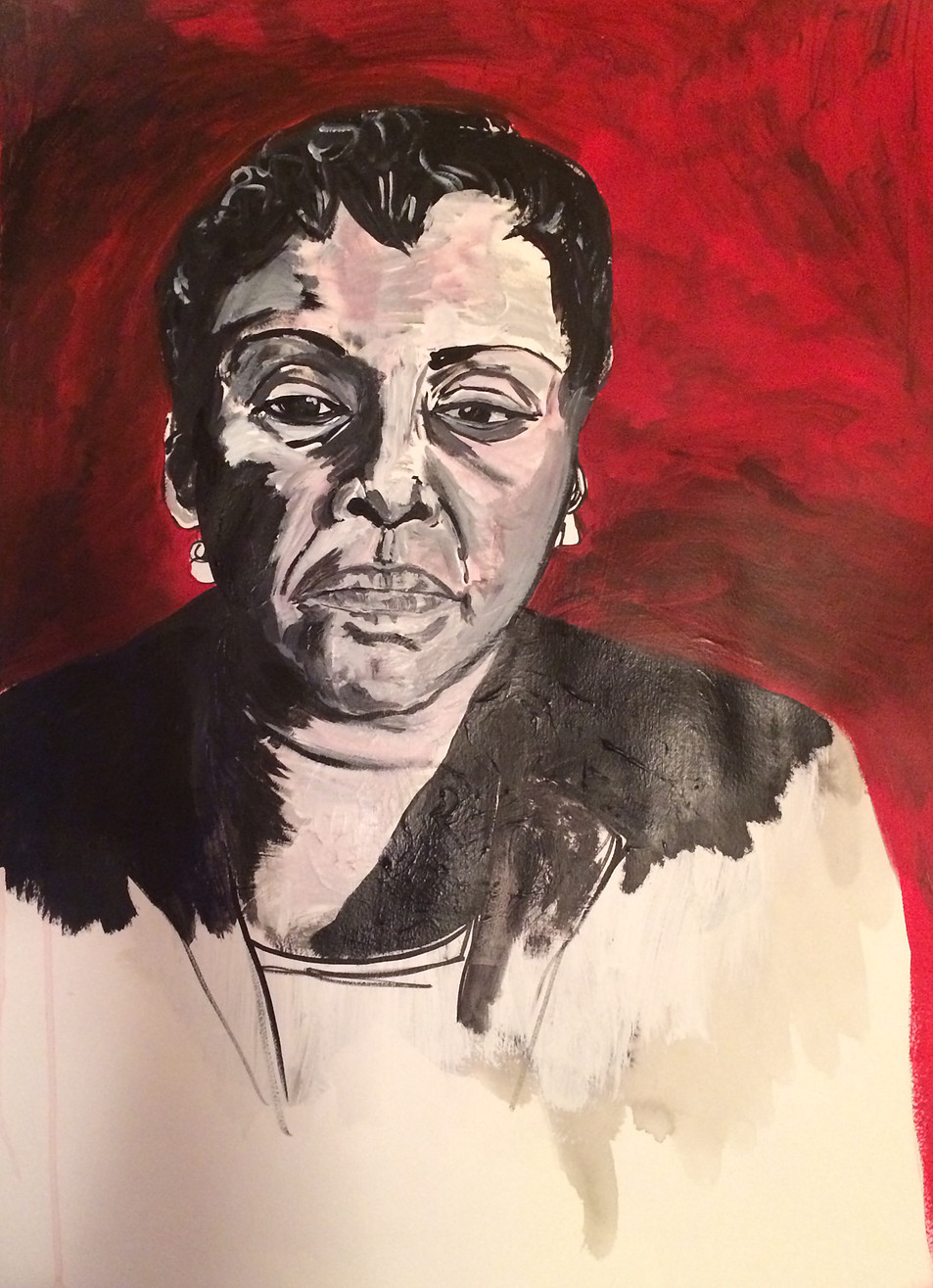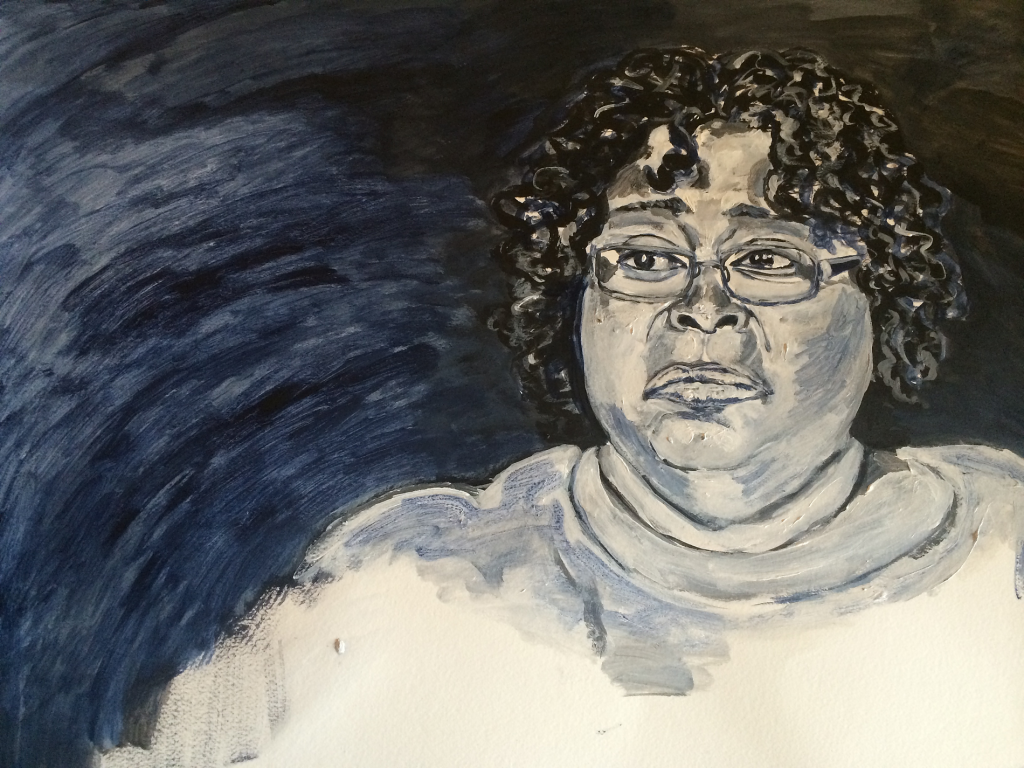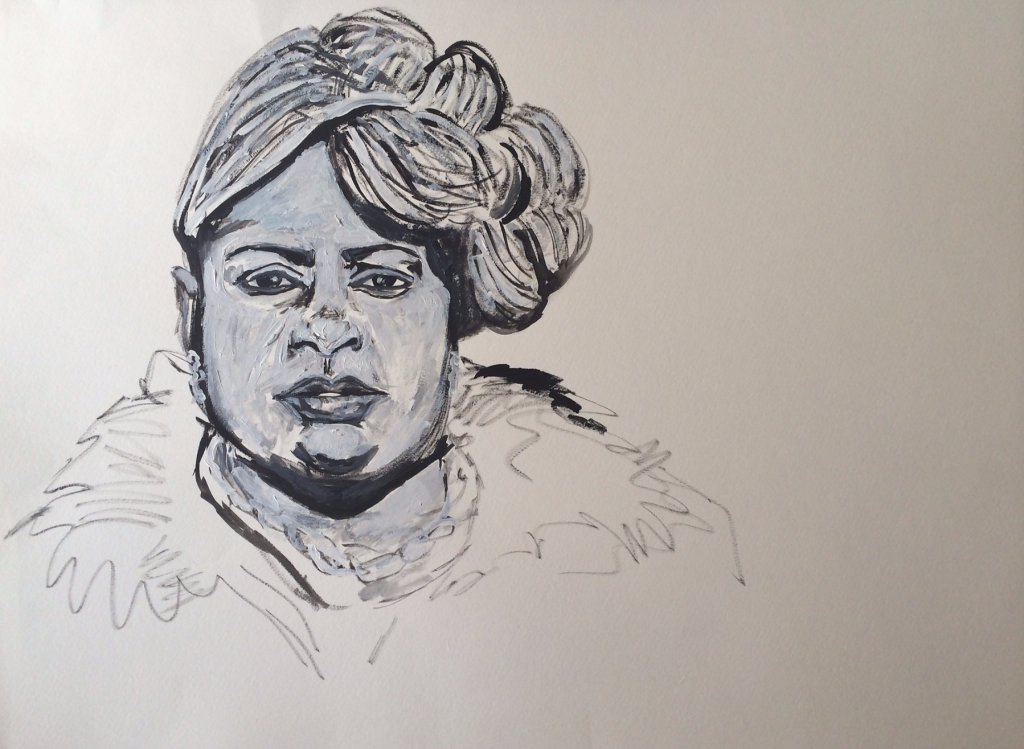They could be any women you might pass in the grocery store, or at the post office; they could be your coworkers or someone you recall seeing around the neighborhood. At first glance, there is little that unites them…except their eyes. The women are ordinary enough. But their eyes—darkened, troubled, looking askance, half-lidded in sorrow—tell a different story.
Sybrina Fulton. Lucia McBath. Lesley McSpadden. Geneva Reed-Veal. If you don’t know their names, you know the names of their children: Trayvon Martin. Jordan Davis. Mike Brown. Sandra Bland. American Moms, by painter Alyssa Liles-Amponsah, unites their faces and their stories in a portrait series of mothers whose unarmed children have been killed by police. The series foregrounds those who, in some ways, are the most tragic victims of state violence, whose grieving is at once perversely public and quickly forgotten.
Liles-Amponsah, whom I know well, lives in Columbia, Missouri (about two hours from Ferguson) and began the series in 2014 after seeing McSpadden on television in the wake of Mike Brown’s death. “I started to think a lot about how these mothers were being portrayed in the media,” says Liles-Amponsah. “I didn’t feel they were being treated with love and respect or dignity or compassion. She found out about her son being dead from seeing pictures on a cell phone…And as time went on, they were critiquing her character and her background, and using that to justify his death.” Liles-Amponsah began sketching McSpadden, as a way of trying to understand what it meant to lose one’s child and mourn in public, but also as a way of working through her own experiences as an African-American mother of a young child.
From President Ronald Reagan’s notorious “welfare queen” rhetoric to resurgent media images of the “bad black mother,” the idea that black mothers are lazy, negligent, or harmful to their children is a familiar one. It is one iteration of a much older American cultural script, a narrative that binds together every stereotype of black women, from mammy to fast-tailed girl: the idea that black women are not quite women, not quite human, not mothers or sisters or daughters or friends deserving of empathy. Through this lens, black women whose children are killed at the hands of the state become, themselves, objects of scrutiny and suspicion.
Indeed, American Moms has been received with controversy and anger. Liles-Amponsah, a teacher, was invited by the superintendent of her local school district to display the paintings in their administrative building. When the local newspaper covered the show, commenters called the work “ridiculous,” “racial pandering,” “totally sick and disgusting and intolerant and hateful.” Liles-Amponsah herself refused to read the internet comments even when others approached her with concern. But when a friend of hers posted the article on Facebook and invited others to view the paintings while they were on display, someone commented that they couldn’t support the show because it was “inciting violence.”
In another local article covering the exhibit, the author listed contextual information regarding each individual’s death—the cause of death and whether the person who killed them was convicted—that Liles-Amponsah did not herself include in the exhibit. “I think that made people even more angry,” Liles-Amponsah says. “I made a choice when I put [the paintings] up to put the name of the mother and the name of their child,” she told me. “But never did I tell their stories, because I wanted to encourage people to look it up on their own and have their own story of understanding…. I think I do connect very much as a mother. My child is my world. I can’t imagine her being taken so thoughtlessly, so carelessly, and then to be treated so terribly in the aftermath.”
In a sense, the reaction Liles-Amponsah has received toward the work as a black woman artist and mother mirrors the attitude of contempt to which the mothers she paints have been subjected. The act of black mothering is audacious enough; the temerity of a black mother to depict the mourning of other black mothers as though it were a phenomenon worthy of dignity is its own sort of audacity. And yet, even in the face of this dismissal and derision, black mothers whose children have been murdered have long made the difficult choice to grieve in public, in the hopes that their mourning testimony will curtail the threats to other women’s children at the hands of a racist nation. This public grieving is a harrowing tradition that dates from Mamie Till Mobley’s decision to maintain an open casket at the funeral of her son to Geneva Reed-Veal’s testimony before the Congressional Black Caucus, in which she told representatives, “I am here representing the mothers who have lost children as we go on about our daily lives. When the cameras and lights are gone, our babies are dead. So I’m going to ask you here today to wake up. Wake up. You all are among the walking dead, and I am so glad that I have come out from among you.”
Perhaps this latest portrayal of and addition to that legacy of grieving in public will stick. Maybe, in its plaintive presentation of black women as people who have loved and lost, American Moms has the potential to awaken others—if they are able, that is, to overcome their belief that the black mothers portrayed are barely mothers at all.



